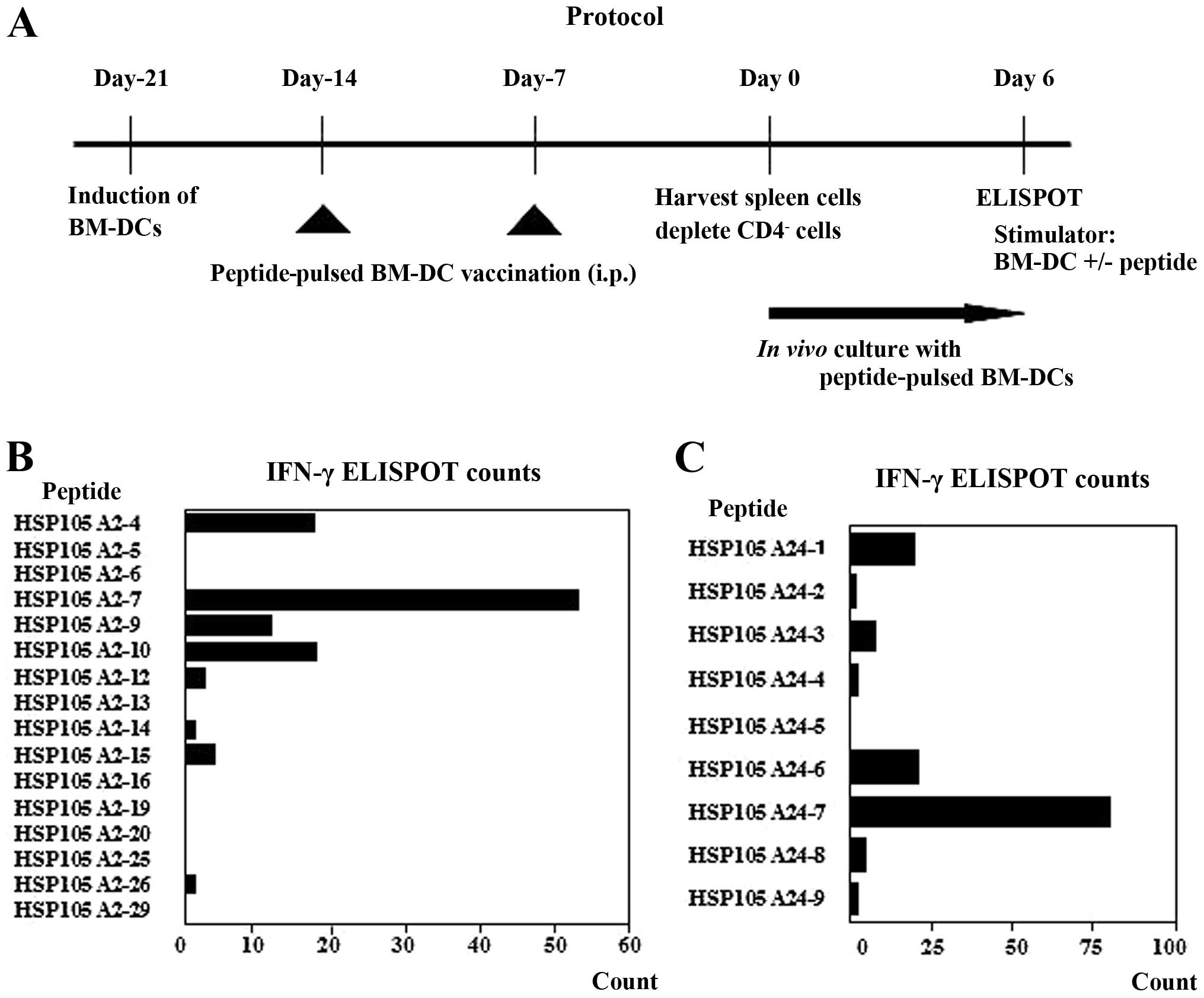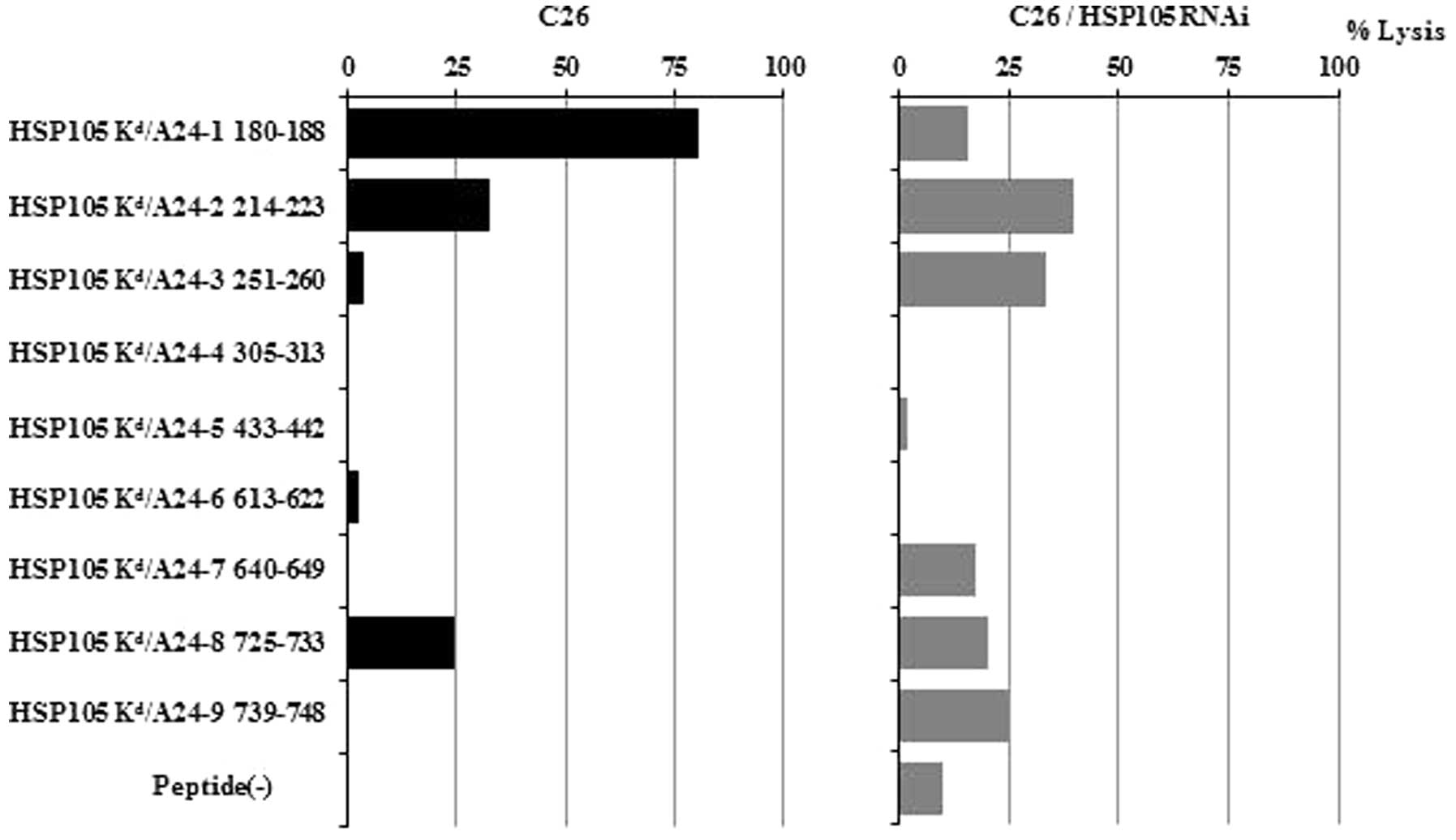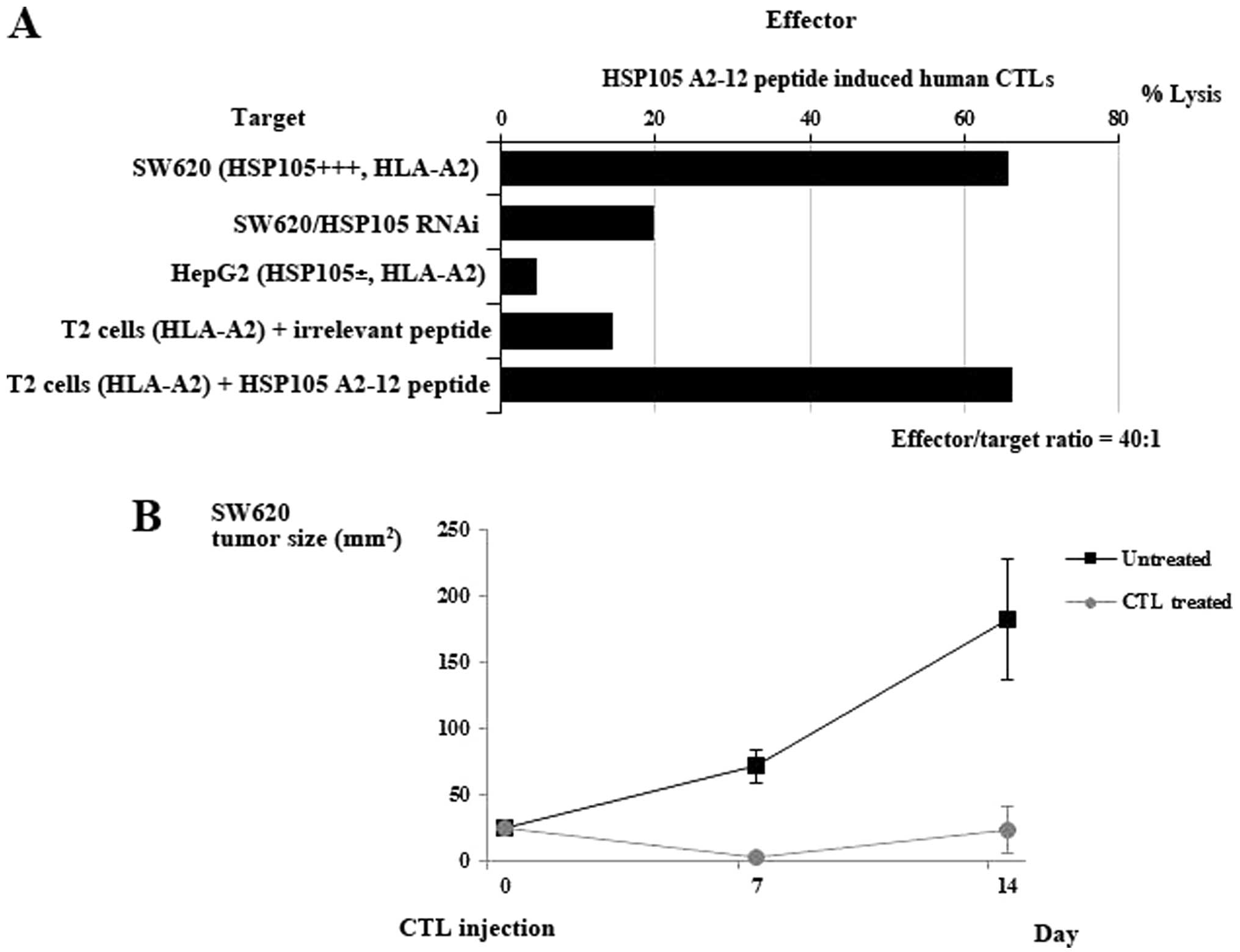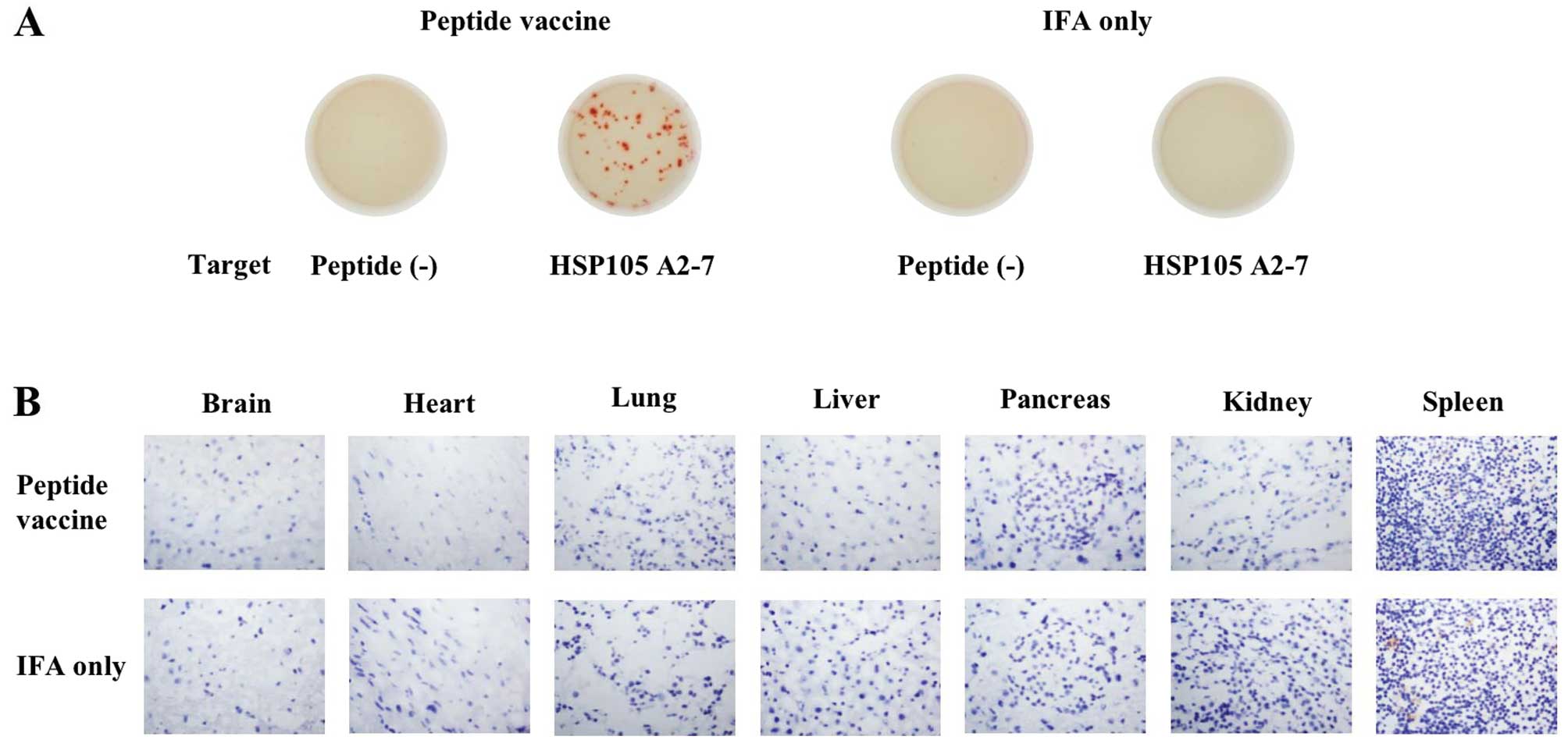|
1
|
Weitz J, Koch M, Debus J, Höhler T, Galle
PR and Büchler MW: Colorectal cancer. Lancet. 365:153–165. 2005.
View Article : Google Scholar
|
|
2
|
Mlecnik B, Tosolini M, Kirilovsky A, et
al: Histopathologic-based prognostic factors of colorectal cancers
are associated with the state of the local immune reaction. J Clin
Oncol. 29:610–618. 2011. View Article : Google Scholar : PubMed/NCBI
|
|
3
|
Nakatsura T, Senju S, Yamada K, Jotsuka T,
Ogawa M and Nishimura Y: Gene cloning of immunogenic antigens
overexpressed in pancreatic cancer. Biochem Biophys Res Commun.
281:936–944. 2001. View Article : Google Scholar : PubMed/NCBI
|
|
4
|
Kai M, Nakatsura T, Egami H, Senju S,
Nishimura Y and Ogawa M: Heat shock protein 105 is overexpressed in
a variety of human tumors. Oncol Rep. 10:1777–1782. 2003.PubMed/NCBI
|
|
5
|
Hatayama T, Yasuda K and Nishiyama E:
Characterization of high-molecular-mass heat shock proteins and 42
degrees C-specific heat shock proteins of murine cells. Biochem
Biophys Res Commun. 204:357–365. 1994. View Article : Google Scholar : PubMed/NCBI
|
|
6
|
Miyazaki M, Nakatsura T, Yokomine K, Senju
S, Monji M, Hosaka S, et al: DNA vaccination of HSP105 leads to
tumor rejection of colorectal cancer and melanoma in mice through
activation of both CD4 T-cells and CD8 T-cells. Cancer Sci.
96:695–705. 2005. View Article : Google Scholar : PubMed/NCBI
|
|
7
|
Yokomine K, Nakatsura T, Minohara M, et
al: Immunization with heat shock protein 105-pulsed dendritic cells
leads to tumor rejection in mice. Biochem Biophys Res Commun.
343:269–278. 2006. View Article : Google Scholar : PubMed/NCBI
|
|
8
|
Yokomine K, Nakatsura T, Senju S, Nakagata
N and Minohara M: Regression of intestinal adenomas by vaccination
with heat shock protein 105-pulsed bone marrow-derived dendritic
cells in Apc(Min/+) mice. Cancer Sci. 98:1930–1935. 2007.PubMed/NCBI
|
|
9
|
Browning M and Krausa P: Genetic diversity
of HLA-A2: evolutionary and functional significance. Immunol Today.
17:165–170. 1996. View Article : Google Scholar : PubMed/NCBI
|
|
10
|
Pascolo S, Bervas N, Ure JM, Smith AG,
Lemonnier FA and Pérarnau B: HLA-A2.1-restricted education and
cytolytic activity of CD8(+) T lymphocytes from beta2 microglobulin
(beta2m) HLA-A2.1 monochain transgenic H-2Db beta2m double knockout
mice. J Exp Med. 185:2043–2051. 1997.PubMed/NCBI
|
|
11
|
Firat H, Garcia-Pons F, Tourdot S, et al:
H-2 class I knockout, HLA-A2.1-transgenic mice: a versatile animal
model for preclinical evaluation of antitumor immunotherapeutic
strategies. Eur J Immunol. 29:3112–3121. 1999. View Article : Google Scholar : PubMed/NCBI
|
|
12
|
Hosaka S, Nakatsura T, Tsukamoto H,
Hatayama T, Baba H and Nishimura Y: Synthetic small interfering RNA
targeting heat shock protein 105 induces apoptosis of various
cancer cells both in vitro and in vivo. Cancer Sci. 97:623–632.
2006. View Article : Google Scholar : PubMed/NCBI
|
|
13
|
Komori H, Nakatsura T, Senju S, et al:
Identification of HLA-A2- or HLA-A24-restricted CTL epitopes
possibly useful for glypican-3-specific immunotherapy of
hepatocellular carcinoma. Clin Cancer Res. 12:2689–2697. 2006.
View Article : Google Scholar : PubMed/NCBI
|
|
14
|
Nakatsura T, Komori H, Kubo T, et al:
Mouse homologue of a novel human oncofetal antigen, glypican-3,
evokes T-cell-mediated tumor rejection without autoimmune reactions
in mice. Clin Cancer Res. 10:8630–8640. 2004. View Article : Google Scholar : PubMed/NCBI
|
|
15
|
Nakatsura T, Senju S, Ito M, Nishimura Y
and Itoh K: Cellular and humoral immune responses to a human
pancreatic cancer antigen, coactosin-like protein, originally
defined by the SEREX method. Eur J Immunol. 32:826–836. 2002.
View Article : Google Scholar
|
|
16
|
Yoshitake Y, Nakatsura T, Monji M, et al:
Proliferation potential-related protein, an ideal esophageal cancer
antigen for immunotherapy, identified using complementary DNA
microarray analysis. Clin Cancer Res. 10:6437–6448. 2004.
View Article : Google Scholar
|
|
17
|
Monji M, Nakatsura T, Senju S, et al:
Identification of a novel human cancer/testis antigen, KM-HN-1,
recognized by cellular and humoral immune responses. Clin Cancer
Res. 10:6047–6057. 2004. View Article : Google Scholar : PubMed/NCBI
|
|
18
|
Feder ME and Hofmann GE: Heat-shock
proteins, molecular chaperones and the stress response:
evolutionary and ecological physiology. Annu Rev Physiol.
61:243–282. 1999. View Article : Google Scholar : PubMed/NCBI
|
|
19
|
Craig EA, Weissman JS and Horwich AL: Heat
shock proteins and molecular chaperones: mediators of protein
conformation and turnover in the cell. Cell. 78:365–372. 1994.
View Article : Google Scholar : PubMed/NCBI
|
|
20
|
Hwang TS, Han HS, Choi HK, et al:
Differential, stage-dependent expression of Hsp70, Hsp110 and Bcl-2
in colorectal cancer. J Gastroenterol Hepatol. 18:690–700. 2003.
View Article : Google Scholar : PubMed/NCBI
|
|
21
|
Kawakami Y and Rosenberg SA: Human tumor
antigens recognized by T-cells. Immunol Res. 16:313–339. 1997.
View Article : Google Scholar : PubMed/NCBI
|
|
22
|
van der Bruggen P, Traversari C, Chomez P,
et al: A gene encoding an antigen recognized by cytolytic T
lymphocytes on a human melanoma. Science. 254:1643–1647. 1991.
|
|
23
|
Kawakami Y, Eliyahu S, Delgado CH, et al:
Identification of a human melanoma antigen recognized by
tumor-infiltrating lymphocytes associated with in vivo tumor
rejection. Proc Natl Acad Sci USA. 91:6458–6462. 1994. View Article : Google Scholar : PubMed/NCBI
|
|
24
|
Srivastava P: Interaction of heat shock
proteins with peptides and antigen presenting cells: chaperoning of
the innate and adaptive immune responses. Annu Rev Immunol.
20:395–425. 2002. View Article : Google Scholar
|
|
25
|
Hickman-Miller HD and Hildebrand WH: The
immune response under stress: the role of HSP-derived peptides.
Trends Immunol. 25:427–433. 2004. View Article : Google Scholar : PubMed/NCBI
|
|
26
|
Romero P, Cerottini JC and Speiser DE:
Monitoring tumor antigen specific T-cell responses in cancer
patients and phase I clinical trials of peptide-based vaccination.
Cancer Immunol Immunother. 53:249–255. 2004. View Article : Google Scholar : PubMed/NCBI
|
|
27
|
Jäger E, Chen YT, Drijfhout JW, et al:
Simultaneous humoral and cellular immune response against
cancer-testis antigen NY-ESO-1: definition of human
histocompatibility leukocyte antigen (HLA)-A2-binding peptide
epitopes. J Exp Med. 187:265–270. 1998.
|
|
28
|
Gao FG, Khammanivong V, Liu WJ, Leggatt
GR, Frazer IH and Fernando GJ: Antigen-specific
CD4+T-cell help is required to activate a memory
CD8+T-cell to a fully functional tumor killer cell.
Cancer Res. 62:6438–6441. 2002.PubMed/NCBI
|


















